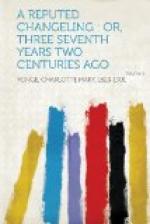“No use,” he gloomily said. “I believe you, but the others will never believe a woman. No doubt we are watched even now by desperate men, who would rather shoot you than let you escape from our hands.”
It seemed almost in connection with these words that at that moment, from some unknown quarter, where probably there was an entrance to the Chine, Sir George Barclay appeared with a leathern case under his arm. It had been captured on the wreck, and contained papers which he wanted assistance in deciphering, since they were in Dutch, and he believed them to be either despatches or bonds, either of which might be turned to profit. These were carried indoors, and spread on the table, and as Anne sat by the window, dejected and almost hopeless as she was, she could not help perceiving that, though Peregrine was so much smaller and less robust than his companions, he exercised over them the dominion of intellect, energy, and will, as if they too felt the force of his strange eyes; and it seemed to her as if, supposing he truly desired it, whatever he might say, he must be able to deliver her and Charles; but that a being such as she had always known him should sacrifice both his love and his hate seemed beyond all hope, and “Change his heart! Turn our captivity, O Lord,” could only be her cry.
Only very late did Burford come back, full of the account of the wreck and of the spoils, and the struggles between the wreckers for the flotsam and jetsam. There was much of savage brutality mated with a cool indifference truly horrible to Anne, and making her realise into what a den of robbers she had fallen, especially as these narratives were diversified by consultations over the Dutch letters and bills of exchange in the wrecked East Indiaman, and how to turn them to the best advantage. Barclay and Burford were so full of these subjects that they took comparatively little notice of the young lady, only when she rose to retire, Burford made a sort of apology that this little business had hindered his going after the parson. He heard that the Salamander was at the castle, and redcoats all about, he said, and if the Annick could be got out to-morrow they must sail any way; and if Pil was still so squeamish, a Popish priest could couple them in a leash as tight as a Fleet parson could. And then Peregrine demanded whether Burford thought a Fleet parson the English for a naval chaplain, and there was some boisterous laughter, during which Anne shut herself up in her room in something very like despair, with that one ray of hope that He who had brought her back from exile before would again save her from that terrible fate.
She heard card-playing and the jingle of glasses far into the night, as she believed, but it seemed to her as if she had scarcely fallen asleep before, to her extreme terror, she heard a knock and a low call at her door of ‘Guennik.’ Then as the Bretonne went to the door, through which a light was seen, a lantern was handed in, and a scrap of paper on which the words were written: “On second thoughts, my kindred elves at Portchester shall not be scared by a worricow. Dress quickly, and I will bring you out of this.”




